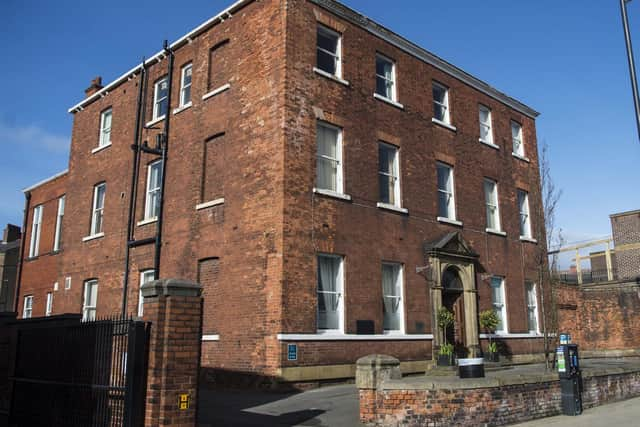Inquest into death of Leeds armed robber left 'riddled with bullets' after he was shot 18 times by Spanish police
and live on Freeview channel 276
Sean Hercules, 39, was reported to have fired at officers before being gunned down during a shootout at a hotel in the Costa Del Sol resort town of Estepona in September 2018.
But an inquest held at Wakefield Coroner’s Court on Friday heard how the coroner could not conclude on the ‘balance of probability’ whether or not he had held a firearm at all.
Advertisement
Hide AdAdvertisement
Hide AdThe court heard how Mr Hercules was involved in a 100mph car crash the morning of his death on September 10, 2018.


He fled the scene and left to a nearby hotel, just a few miles from his residence.
Officers were reportedly looking for him as they claim to have found a firearm left in the vehicle.
At around 5pm, six armed officers, including three plain clothed officers, were reported to have fired 18 times at Mr Hercules through his hotel door.
Advertisement
Hide AdAdvertisement
Hide AdThe court heard how Mr Hercules died from gunshot wounds and was left “riddled with bullets”.
He had a total of 39 total firearm wounds, including one shot through his heart, according to a Spanish post mortem report.
Senior coroner Kevin McLoughlin told the court he was ‘frustrated’ by the ‘conspicuous lack of co-operation’ from the Spanish authorities in establishing the events which led to Mr Hercules’ death.
The court was told the pathologist in Britain who conducted a post-mortem was not given a report, had no access to notes and didn’t have any assistance from their Spanish counterparts.
Advertisement
Hide AdAdvertisement
Hide AdWith the lack of evidence, Mr McLoughlin said he was unable to determine whether or not the Spanish police had killed Mr Hercules lawfully or unlawfully.
Recording an open conclusion, Mr McLoughlin told the court: “To say that I am unsatisfied would be an understatement.
“Despite strenuous efforts to contact the Spanish authorities they have not co-operated.
“We eventually were sent the translated Spanish toxicology report but with the information we were given, I am able to make only limited factual findings.
Advertisement
Hide AdAdvertisement
Hide Ad“It is clear Mr Hercules was shot 18 times and died at the scene.
“It is not clear, even on the standards of balance of probability, if he was in possession of a gun, or more importantly if he sought to shoot the police himself.
“No account has been given at all from Spanish police if he was given an opportunity to surrender before he was shot.
“All I can say this man’s body was riddled with bullets.
“It is an understatement to say I am disappointed by the actions of the Spanish authorities.”
Advertisement
Hide AdAdvertisement
Hide AdMr Hercules’ wife Sheree Ann Dooley, 34, his mother Martha Friel, 66, his step brother Mark Johnson, 41, and his cousin Nick Smith, 35, were all present at the hearing.
Mrs Dooley, who married Mr Hercules in 2013 after he was released from prison following a six-year sentence for shooting a man outside a nightclub with a sawn-off shotgun, told the court her husband had been ‘brutally murdered’.
She said she’s had to tell her two young children, aged nine and six, their father had died from an illness.
In a statement read out in court, she said: "To do that to someone is just evil, absolutely evil.
Advertisement
Hide AdAdvertisement
Hide Ad“He’s a human being. He matters to us. He doesn’t matter to anyone else. But he matters to us. We have two children who have to go through counselling.
“When we got his body he was full of bullet holes and he didn’t have a death certificate."
Martha Friel told the court she felt ‘ashamed to be British’ following the investigation into her son’s death.
She told the court: "I was ashamed to be British, I got no help from the government."
Advertisement
Hide AdAdvertisement
Hide Ad“I can’t understand why the police in Spain shot Sean so many times, it was so excessive.”
Dr Matthew Lyall, a forensic pathologist who performed the post-mortem when Mr Hercules’ body was eventually repatriated to the UK, said he could not confirm whether gunshot residue found on his body indicated he had held a firearm.
The coroner also stated he was not made aware if any firearm belonging to Mr Hercules was ever retrieved during the investigation.
A Spanish toxicology report which was translated said Mr Hercules had traces of MDMA, diazepam, paracetamol and cocaine in his blood.
Advertisement
Hide AdAdvertisement
Hide AdIt went on further to say the concentration of cocaine in the blood is of a level they have identified as levels commonly seen in fatal cocaine intoxication cases.
But Dr Lyall said he was unable to confirm whether or not he had taken those drugs on the day of the shooting
The Spanish coroner determined that Mr Hercules' cause of death was 'violence, hyper bulimic shock, and firearm injuries'.
Dr Lyall's findings concluded he had died from gunshot wounds from a rifled firearm.
Advertisement
Hide AdAdvertisement
Hide AdHe added the number of gunshots was 'not common' and the most he'd seen in a single case.
Speaking following the hearing, Mr Hercules' step-brother Mark Johnson branded the entire investigation a 'cover up' and added that it was the 'biggest hush case' he'd ever seen.
He said: “This has been a Spanish cover up.
“It has affected the grieving process even two years on. I feel for his wife, his mother, his children who are still going through the pain.
“This is the biggest hush case I’ve seen."
He added: "We washed his body, as Muslim you have to be washed by a loved one before you can depart, and I took that on.
“I could feel every single bullet shot that went through him - it was the most difficult thing I’ve ever done."